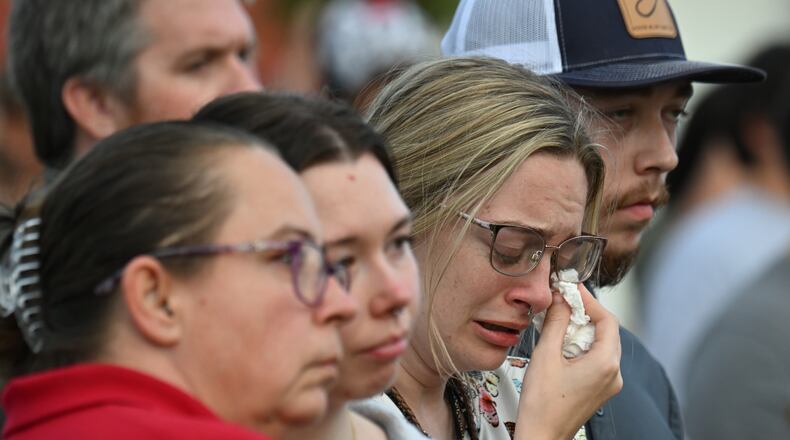For the Rev. Dr. Geoffrey Murphy of the Winder First United Methodist Church, the priority right now after Wednesday’s deadly school shooting is to make sure no one in the town east of Atlanta grieves alone.
“Fellowship tells us we can’t fix it, but we can help you not go through it by yourself,” Murphy told The Atlanta Journal-Constitution.
On Wednesday, a 14-year-old who had been known to the FBI for previous threats to commit a school shooting, opened fire at Barrow County high school in Winder, killing two students and two teachers, and injuring nine others with an AR-platform-style weapon, according to investigators.
For religious leaders in the community, the goal after such a burst of tragedy is to provide the succor of prayer and a shoulder for anyone to cry on, irrespective of faith ties, Murphy said.
Rev. Chris Strickland, assistant pastor at Winder First United Methodist Church and a student at Candler School of Theology at Emory University, said at least 10 churches are taking part in religious outreach efforts in Winder. Churches outside the Peach State are also pledging support. “I was getting calls from as far away as Texas from people praying to lift us up,” Strickland said.
Rev. Frank Bernat, senior pastor at Bethlehem First United Methodist in Winder, said his church has opened its sanctuary for people to come and pray. It has also organized a special 5 p.m. Sunday prayer service, where grief counselors and licensed therapists will be on hand to prepare the teachers and students to return to class on Monday, Bernat said.
Though the pastors haven’t decided yet what they will say this Sunday during their sermons, they hope to reinforce the message that communities need to come together to protect students and help those with mental illness.
“I’m not the ‘thoughts and prayers guy,’” Strickland said.’ “But I am asking how do I turn my rage into an action that builds community, including love for the aggressor?”
That spirit of love is what led Chaplain Al New of the Power Point Ministries in Kingsport, Tennessee, to make the nearly four-hour drive last night to Winder. New is the Billy Graham Rapid Response chaplain coordinator on the ground, and spent much of the day Thursday at the school in Winder where the shooting took place.
“Law enforcement has the school fenced off,” New told the AJC. “But outside the school at the flagpole, people are laying flowers. Most of the people here right now are media from around the country. But family members are showing up with flowers.”
New said the Billy Graham Rapid Response team was invited by the Ebenezer Baptist Church in the nearby town of Dacula. The team from the church, founded by the late Christian evangelist, has been on-site at natural disasters like Hurricane Katrina and numerous American school shootings. It was founded in the weeks after September 2001 near New York’s ground zero, where chaplains sat at a simple table on which appeared the words “Need to talk?”
“I learned that the ministry is out on the street, not necessarily in the church all the time,” New said. “And that my heart and role is to minister to those who are hurting.”
Religious leaders can play a critical role in forging a sense of togetherness in such crises, said Arun W. Jones, the Dan and Lillian Hankey Associate Professor of World Evangelism and Director of the Master of Theology Program at Emory University.
“The first people on the ground are the leaders of the local houses of worship,” Jones told the AJC.
Jones said the religious figures often work together with school social workers and counselors to help the victims and their families.
Jones said in most communities around the U.S., there’s usually an informal network of faith leaders across religious lines, where pastors come together and help each other out as much as possible.
He says pastors will email each other and say: “I’ve heard about this and I will keep you in my prayers.”
And as tempting as it is to point fingers as to why the U.S. struggles with high gun deaths, the goal now, he said, is to welcome good faith attempts to support the victims.
“You can’t predict a person’s compassion for someone else based on their political views,” he noted.
About the Author
Keep Reading
The Latest
Featured


